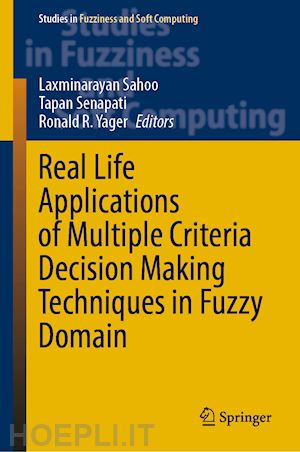
Questo prodotto usufruisce delle SPEDIZIONI GRATIS
selezionando l'opzione Corriere Veloce in fase di ordine.
Pagabile anche con Carta della cultura giovani e del merito, 18App Bonus Cultura e Carta del Docente
This edited book discusses creative and recent developments of fuzzy systems and its real-life applications of multiple criteria decision making. Keeping on the existing fuzzy sets and recent developed fuzzy sets, viz., intuitionistic fuzzy, Pythagorean fuzzy, Fermatean fuzzy, Hesitant fuzzy and multiple criteria decision approaches, this book is committed to probing the soft computing techniques and fuzzy multiple criteria decision making in favour of fuzzy intelligent system and business analytics. It also addresses novel development of fuzzy set theory as well as real-life applications of fuzzy systems. It presents challenging and useful real-world applications based on problems of decision making in various fields. The modelling and solution procedures of such real-world problems will be provided concisely although all topics start with a more developed resolution.
The contributory chapters will be based on the vast research experiences of the authors in real-worlddecision-making problems. This book provides readers with a valuable conspectus of several decision-making problems as a reference for researchers and industrial practitioners in this field. This book will broadly cover recent development of fuzzy systems and its applications of multiple criteria decision making in the areas of management and production, manufacturing management, selections problems, group decision making, transportation and logistics, inventory control systems and interval technique/fuzzy technique (uncertainty) of the above mentioned areas.
Laxminarayan Sahoo is currently an Associate Professor of Computer and Information Science, Raiganj University, Raiganj, India. He obtained his MSc from Vidyasagar University, India and his PhD from The University of Burdwan, India. He has received MHRD fellowship from Govt. of India during his M. Tech. course at ISM, Dhanbad, India and also received Prof. M.N. Gopalan Award for Best PhD thesis in Operations Research from Operational Research Society of India (ORSI). Dr. Sahoo has successfully guided 01 research scholars for PhD degree, four students continuing their PhD degree and has published a good number of articles in international and national journals of repute. He is a reviewer of several international journals and Academic Editor of International Journal “Mathematical Problems in Engineering”, Hindawi Publication. He has also successfully completed one UGC minor research project. His specializations include, Wireless Sensor Network, Distributed Computing, Reliability Optimization, Genetic Algorithms, Particle Swarm Optimization, Graph Theory, Fuzzy Game Theory, Interval Mathematics, Soft Computing, Fuzzy Decision making and Operations Research. He is also a reviewer of several national and international journals. Dr. Sahoo is the author of the books “Advanced Operations Research” published by Asian Books, New Delhi, “Advanced Optimization and Operations Research” published by Springer Nature, Singapore.
Tapan Senapati received the B. Sc., M. Sc. and Ph.D. degrees in Mathematics all from the Vidyasagar University, India in 2006, 2008, and 2013 respectively. Presently he works as an Assistant Teacher of Mathematics under Govt. of West Bengal, India. He has also worked as Postdoctoral fellow at Southwest University, School of Mathematics and Statistics, 400715 Chongqing, China. He has published two books and more than 70 articles in reputed international journals. His research results have been published in Fuzzy Sets and Systems, IEEE Transactions on Fuzzy Systems, Applied Soft Computing, Engineering Applications of Artificial Intelligence, International Journal of Intelligent Systems, and International Journal of General Systems, among others. He is a reviewer of several international journals and is also an academic editor of Computational Intelligence and Neuroscience, Discrete Dynamics in Nature and Society, Mathematical Problems in Engineering. His main scientific interests concentrate on fuzzy sets, fuzzy optimization, soft computing, multi-attribute decision making, aggregation operators.
Ronald R. Yager has worked in the area of machine intelligence for over twenty-five years. He has published over 500 papers and more than thirty books in areas related to artificial intelligence, fuzzy sets, decision-making under uncertainty and the fusion of information. He is among the world’s top 1% most highly cited researchers with over 85,000 citations. He was the recipient of the IEEE Computational Intelligence Society’s highly prestigious Frank Rosenblatt Award in 2016. He was the recipient of the IEEE Systems, Man and Cybernetics Society 2018 Lotfi Zadeh Pioneer Award. He was also the recipient of the IEEE Computational Intelligence Society Pioneer award in Fuzzy Systems. He received honorary doctorates from the Azerbaijan Technical University, the State University of Information Technologies, Sofia Bulgaria and the Rostov on the Don University, Russia. Dr. Yager is a fellow of the IEEE and the Fuzzy Systems Association. He was given a lifetime achievement award by the Polish Academy of Sciences for his contributions. He served at the National Science Foundation as program director in the Information Sciences program. He was a NASA/Stanford visiting fellow and a research associate at the University of California, Berkeley. He has been a lecturer at NATO Advanced Study Institutes. He is a Distinguished Adjunct Professor at King Abdulaziz University, Jeddah, Saudi Arabia. He was a distinguished honorary professor at the Aalborg University Denmark. He was distinguished visiting scientist at King Saud University, Riyadh, Saudi Arabia. He received his undergraduate degree from the City College of New York and his Ph. D. from the Polytechnic University of New York. He was editor and chief of the International Journal of Intelligent Systems. He serves on the editorial board of numerous technology journals. Currently he is an Emeritus Professor at Iona College and is director of the Machine Intelligence.











Il sito utilizza cookie ed altri strumenti di tracciamento che raccolgono informazioni dal dispositivo dell’utente. Oltre ai cookie tecnici ed analitici aggregati, strettamente necessari per il funzionamento di questo sito web, previo consenso dell’utente possono essere installati cookie di profilazione e marketing e cookie dei social media. Cliccando su “Accetto tutti i cookie” saranno attivate tutte le categorie di cookie. Per accettare solo deterninate categorie di cookie, cliccare invece su “Impostazioni cookie”. Chiudendo il banner o continuando a navigare saranno installati solo cookie tecnici. Per maggiori dettagli, consultare la Cookie Policy.